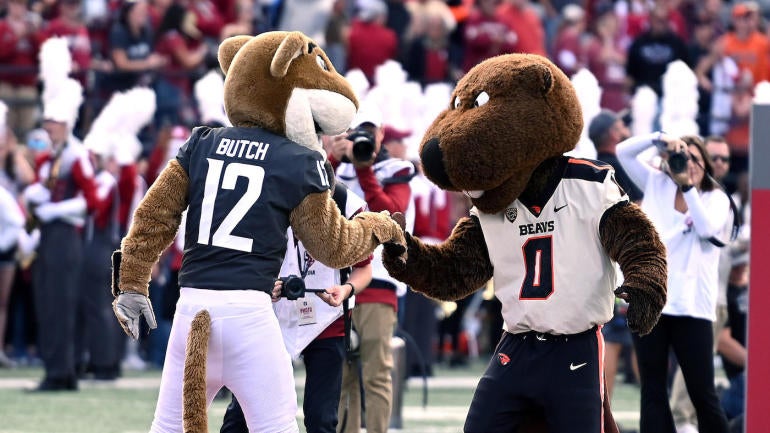
Oregon State and Washington State have agreed to a football scheduling agreement with the Mountain West for the 2024 season. The deal involves significant financial incentives for the MWC, according to Yahoo Sports. League presidents met Monday night to discuss the arrangement, sources confirmed to CBS Sports' Dennis Dodd, and the deal was finalized on Friday.
The scheduling model involves a "7+1" format, which features Mountain West schools playing seven games against conference opponents and one against either Oregon State or Washington State. The agreement would generate 12 additional games for the "Pac-2" in exchange for approximately $14 million direct payment to the Mountain West, according to Yahoo Sports. The scheduling agreement would only be in practice for the 2024 season.
One source told Dodd, however, the arrangement being discussed is a "1+1," meaning both sides would exercise the option to continue the model in 2025. Oregon State and Washington State would then be on the hook for a $28 million total payment to the Mountain West over the two seasons.
OSU and WSU would not be eligible for the Mountain West Championship Game nor an automatic bid to the College Football Playoff, which expands to 12 teams next season. CFP sources confirmed to Dodd they would be eligible for an at-large berth should they finish in or around the top 12.
"This is a unique and unprecedented opportunity for Oregon State and Washington State to play against highly competitive Mountain West football programs in 2024," Mountain West commissioner Gloria Nevarez said in a statement. "The scheduling agreement will expand the Mountain West footprint and enhance our national brand, while providing our student-athletes with new opportunities, all in line with our strategic priorities. The scheduling arrangement strengthens the league's non-conference schedules, and we look forward to having Oregon State and Washington State be a part of the 2024 slate."
Oregon State and Washington State are planning to use an NCAA rule that gives them two years to reach the eight-member conference minimum, meaning the pair could go through the 2024 and 2025 seasons as a two-team conference. In practice, the duo will function more as independents. The partnership with the Mountain West allows the schools to fill six much-needed slots on the schedule, along with a scheduled game against each other. Washington State and Washington have also agreed in principle to extend the Apple Cup rivalry through at least 2028 as the Huskies move to the Big Ten in 2024.
After the 2025 season, the "Pac-2" will either need to grow the conference to eight members or disband altogether. There is no concrete plan at this time for the league, but a future merger with the Mountain West remains a possibility.
Mountain West home games would involve its existing television contract with Fox and CBS Sports Network. The "Pac-2" will negotiate their own separate contracts with television providers for home games.
Long-term stability
The "Pac-2" schools have been dropped in a difficult situation after a final season in the legacy Pac-12. The Cougars' season is over after missing on bowl eligibility following a 24-21 loss to Washington, while Oregon State coach Jonathan Smith left his alma mater to take the Michigan State job.
The pair have been engaged with the Mountain West -- as well as every other Group of Five conference, sources confirmed to Dodd -- for months looking for a solution to keeping at least some semblance of a West Coast football conference together. Partnering with the league allows them to navigate the short term while also planning for the long term. When the two-year buffer period with the NCAA comes to a close, Oregon State and Washington State still have the option of merging.
Financial benefit
Remaining as the "Pac-2" provides meaningful benefit for Washington State and Oregon State in the short term. The league holds meaningful assets, including real estate, NCAA Tournament units and broadcasting resources through the Pac-12 Network. When the 10 other members move on, Oregon State and Washington State could take control of all the remaining assets. If that were to happen, a merger could provide upside to both the Mountain West and Pac-12. That way, the existing Pac-12 assets could potentially be folded into the new conference.
Complicating matters is the ongoing litigation between the "Pac-2" and departing 10. Oregon State and Washington State received a ruling in Whitman County Court that gave it full control of the board; however, the Washington Supreme Court has moved for an emergency stay, which could open the door for the other 10 schools to get voting power back after a ruling on Dec. 12.
The back and forth over the remaining assets will be an ongoing process as Oregon State and Washington State try to figure out what's next.
















